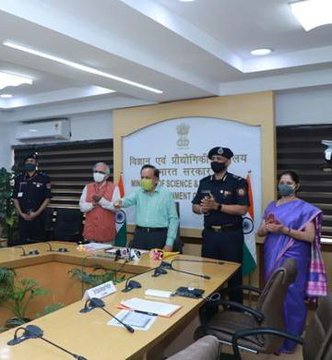Dr. Harsh Vardhan inaugurates a 10-Bedded Make Shift Hospital and isolation centre at 4th Battalion Centre, Chennai
New Delhi: Union Minister for Science & Technology, Earth Sciences and Health & Family Welfare, Dr. Harsh Vardhan today inaugurated a 10-Bedded Make Shift Hospital and isolation centre set up by CSIR at 4th Battalion Centre, Chennai, through video-conference.
Speaking at the occasion, Dr. Harsh Vardhan congratulated CSIR-SERC (Structural Engineering Research Centre) and its scientists as well as National Disaster Response Force (NDRF) for finding innovative solutions to meet new challenges like the one presented by COVID-19. He recalled that a similar facility of a make-shift hospital was constructed at the NDRF campus in Ghaziabad, Uttar Pradesh in August this year. He pointed out, “The new facility at 4th Battalion Centre, NDRF, Chennai is designed as a make-shift hospital solution for the patient to provide primary health facility with safety, security and a comfortable living environment and has a long life span of up to 20 years”. “It demonstrates a modern, durable, fast installable, safe and geographically as well as all-weather compatible fast deployable technology useful for disaster recovery as well as long pandemic or emergency situation”, he added. “The CSIR-SERC laboratory introduced a foldable and framed steel structure, such that a single person can carry a couple of frames on his shoulder and assemble these at any site without much loss of time”, the Minister pointed out.
The Minister also appreciated the efforts of CSIR, which he said, “Has been at the forefront in providing innovative solutions in various fields like repurposing drugs, PPE kits, Testing, ready-to-eat nutritious food with long shelf-life and easy to install multi-purpose shelters and hospitals.” He also said that “because of tireless efforts by all scientists, health workers, NDRF etc, India today has a recovery rate of over 92 percent.”
Dr. Shekhar C. Mande, DG, CSIR said that CSIR scientists have been involved since day one in the fight against COVID-19 in coming up with innovative solutions for different needs, including the fast deployable structures. He informed that CSIR has been approached by the Himachal Pradesh government for installation of three such hospitals of 50 bed-capacity each at different places in the state and that CSIR will soon construct them there with new technology. “Based on the experience gained by this technology demonstration exercise, CSIR-SERC can now scale-up the facility in multiples of 100 beds and can efficiently execute it at site with technology partners, anywhere in India,” he added.
Shri S. N. Pradhan, DG, NDRF invited CSIR for more such demonstration projects for NDRF at its facilities at various places. He said, “NDRF needs such solutions to meet its challenges of relief and rescue operations in far-flung remote areas where its personnel may be deployed for even months at a stretch”. He said, “The Disaster Management authorities can keep such frame shelters ready and transport them to the site of disaster for immediate need in different states. By modularly adding more bays, shelters can be constructed for medical teams, godowns, schools, rest houses and also tourist huts in peace time”.
The Isolation Centre has been set up by NDRF HQ, New Delhi in collaboration with CSIR-SERC, Chennai at a cost of Rs 37.67 Lakhs. This facility is equipped with ECG Monitors, Defibrillators, Pulse Oximeter, emergency oxygen supply cylinders. This is a much needed facility to provide medical care for COVID-19 infected NDRF personnel returning from various disaster rescue operations.
The system at Arakkonam is designed to have features like rapid erection, foldable, light in weight, safe, comfortable, economical, re-buildability with adequate thermal insulation and water proofing feature and make use of locally available skills.These pre-fabricated makeshift hospital structures not only excel in rapid installation with minimum assistance and equipments but are also easy to store and transport, are cost-effective as well as extendable.
The additional features include anti-ultraviolet nature to protect the people from harmful U-V rays, multipurpose usage of space, high structural performance, water resistance, fire retardant, durability, renewable and anti-bacterial materials.
The event was joined online by DrPalani, Chief Scientist, CSIR-SERC, Chennai; Prof. S. Kapuria, Director, SERC, Chennai, and several other scientists and officials of CSIR and NDRF.

